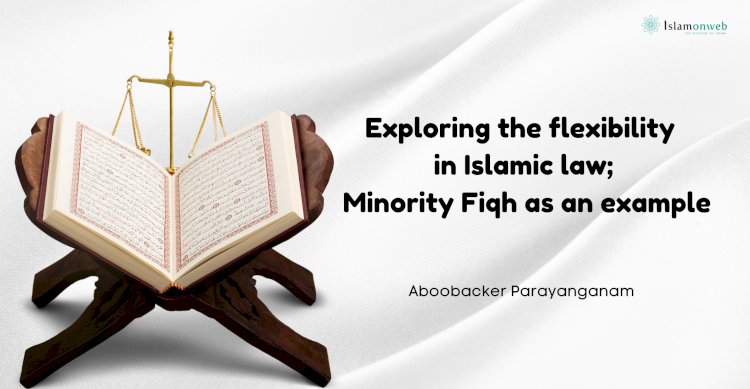Exploring the flexibility in Islamic law; Minority Fiqh as an example
Islam, as the true religion bequeathed to us by Prophet Muḥammad, the final messenger, is a set of principles, rules, and regulations enacted by Allah. These principles are suitable for all humanity, regardless of time or place. As a divine message meant to guide humanity until the Last Day, Islam encompasses every sphere of life, including individual, social, national, and international relations. Therefore, Islam is distinguished by its comprehensiveness, balance, and perfection. Allah affirms in the Qur'an: "We have neglected nothing in the Book" (6:38) [1], which means that Islam is capable of addressing every challenge. Additionally, Allah sent Prophet Muḥammad as a universal messenger: "We have sent you only as a bearer of good news and a warner to all of humanity" (34:28) [2]. Thus, Islam remains profoundly accessible to all people at all times.
Sources of Islamic law
The Qur'an and Sunnah, both divinely revealed, are the primary sources of the Islamic legal system. However, there are many issues for which no explicit text is available. In such cases, Allah has left some texts open to interpretation or ambiguity, providing scholars with an opportunity to conduct research and extract rulings through reliable methods of istinbāṭ (derivation of rulings), as prescribed by uṣūlī scholars. After the Qur'an and Sunnah, ijmāʿ (scholarly consensus) and qiyās (analogy), which are rooted in the Qur'an and Sunnah, are also recognized as major sources. Together, these four are the agreed-upon sources across all schools of fiqh.
In addition, to represent the richness and depth of Islamic jurisprudence, the Imams have adopted various forms of evidence in their differing views and opinions. Some of these are considered independent or dependent dalīl (evidence), either conditionally or unconditionally. This includes istiḥsān (juridical preference), maṣāliḥ mursala (consideration of public interest), saddu ḏ-ḏarāʾiʿ (blocking the means), ʿurf (custom), and istiṣḥāb (presumption of continuity) [3].
Dr. Muḥammad Aḥmad Burkāb states: “Allah made the texts of Islamic law both general and specific. For the specific ones, He made them of the highest levels of clarity and concealment, allowing them to be areas of ijtihād (independent reasoning) among scholars, thereby widening the scope to address the greatest number of issues and incidents across all times and places. As for the general rules, they are qawāʿid kulliyya (universal principles) derived through istiqrāʾ (extrapolation) from the entire body of texts, which address emerging issues and developments." [4]
Exploring the Prime Objectives Behind the Corpus of Sharīʿa Laws
In exploring the fundamental objectives behind the corpus of Sharīʿa laws, scholars have deduced that the primary aim is to bring about benefits and ward off harm for both the individual and the community. The laws of Sharīʿa are designed to protect these benefits and facilitate the improvement and perfection of human life. ʿIzz ibn ʿAbd al-Salām affirms this, stating: "Whoever follows the purpose of Sharīʿa to bring benefit and ward off harm will realize that these benefits must not be neglected, and harm should not be approached, even if there is no explicit text or consensus on the matter, because following Sharīʿa reveals this understanding." [5]
Imām al-Ghazālī further clarifies this notion by explaining that the Sharīʿa, as denoted by uṣūlī scholars, primarily aims to preserve five key principles—religion, life, intellect, lineage, and wealth. Therefore, anything that preserves these five principles is considered a maṣlaḥa (benefit), while anything that harms them is a mafsada (harm) that must be avoided or corrected[6].
Abū Isḥāq al-Shāṭibī (d. 790 AH) was a prominent scholar who categorized these universal higher objectives of the Sharīʿa in his book Al-Muwāfaqāt fī Uṣūl al-Aḥkām in the science of uṣūl al-fiqh.
By identifying these higher objectives of Sharīʿa, scholars have been able to develop a general philosophy of Islamic law, which can be applied when issuing rulings and fatāwā. Thus, in cases where no religious text or explicit legal provision exists, new issues can be resolved by aligning them with the higher objectives of Sharīʿa. Since new issues are endless and the principles of uṣūl are limited, this approach provides a method to address contemporary challenges. Imām al-Shāfiʿī emphasized this method by stating that another way to derive rulings is to adhere to interests, based on the conditions and objectives of Sharīʿa law, in a comprehensive manner[7].
In summary, the Islamic legal system is well-established and comprehensive, capable of addressing any possible challenge or question by producing legal rulings and solutions.
Islamic Law Stands for Flexibility
Islamic legislative sources are marked by a unique balance of rigidity and flexibility in the issuance of rulings. This balance ensures that Islamic principles and doctrines are preserved from being neglected or misinterpreted. Islam consistently seeks ease for human beings, relieving them of burdens and the shackles that were previously placed upon them[8]. The Qur’anic verse, "And He has not laid upon you in religion any hardship" (22:78) [9], affirms the foundation of Islam, which is rooted in clemency and ease. Furthermore, Prophet Muḥammad explicitly emphasized this feature of Islam, stating that he was sent with the easy Ḥanīf religion[10].
The legality of concessions, which are widely recognized in Islamic law, such as shortening and combining prayers (al-jamʿ wal-qaṣr) for travelers, breaking the fast, or consuming forbidden items when necessary, is a clear example that Islam prioritizes the removal of hardship and difficulty[11].
Sharīʿa laws are therefore based on clemency and moderation, rather than oppression and severity. Muslims understand that the fulfillment of religious obligations is contingent upon human ability. They also recognize that Sharīʿa permits all that is clean and wholesome and forbids what is harmful, with the aim of making life easier and more convenient[12].
Dr. Muḥammad Aḥmad Burkāb identifies several factors contributing to the flexibility of Islamic jurisprudence. He explains that a wide space has been left by the legal texts for the ijtihād of diligent scholars, allowing them to apply rulings that are best suited for the people and appropriate to their time and place. He categorizes muʿāmalāt (human interactions) into two types: the first seeks constancy and stability, such as matters of belief and worship, while the second allows for change with the passage of time and variations in place. The texts concerning the latter are generally flexible, reflecting Allah’s desire not to impose hardship or distress on His servants[13].
Concept of Minority Fiqh
The Fiqh of Minorities (fiqh al-aqalliyāt) refers to the jurisprudential rulings concerning Muslim minorities living outside Islamic lands[14]. One of the leading proponents of this fiqh, Ṭāhā Jābir al-ʿAlwānī, explains that "Fiqh for minorities" is a specific discipline that considers the relationship between religious rulings and the conditions of the community in the location where it exists. This fiqh applies to a specific group of people living under particular circumstances with unique needs that may not be applicable to other communities[15]. Al-ʿAlwānī emphasizes that Muslim minorities, especially those residing in the West, require a new legal discipline to address their distinct religious needs, which differ from those of Muslims living in Islamic countries[16].
Another prominent advocate of minority fiqh, Dr. Yūsuf al-Qarḍāwī, categorizes Muslim minorities residing outside of Islamic nations into two groups: those who are the original inhabitants of the country and those who are new immigrants from Islamic countries[17].
Today, a large number of Muslim communities reside in non-Islamic countries, where they face radical challenges and unprecedented situations that could not have been anticipated in Islamic nations. Shammai Fishman, in his work Fiqh al-Aqalliyyāt: A Legal Theory for Muslim Minorities, reports an estimate by Ahmad Rawi, chairman of the Union of Islamic Organizations in Europe (UIOE), that approximately 15.84 million Muslims live in Western Europe, making up 4.43% of its total population. In France alone, there are 5.5 million Muslims in a population of nearly 56.6 million, and in Germany, 3.2 million out of 79.1 million[18].
Therefore, a reshaped Islamic concept within the framework of Islamic jurisprudence is needed to enable Muslim minorities to adapt to their necessities and preserve their faith and identity.
Islam Deals with Minority Issues
Muslims residing in non-Islamic countries face a variety of challenges and issues—social, cultural, political, religious, and economic—which are not typically experienced by their co-religionists in Islamic nations. These challenges range from simply living in non-Islamic countries (despite the existence of a ḥadīth that discourages it), to acquiring citizenship, which may be followed by military conscription that could result in fighting against Islamic countries. Other challenges include the legality of food and drinks that may contain pork fat or wine, the legitimacy of marriages or divorces conducted by official authorities, dealing with usurious banks, burying Muslims in non-Muslim cemeteries, participating in political affairs, and extending greetings on the religious holidays of Jews and Christians. The question arises: how should a Muslim in a non-Muslim country address these issues when they are unavoidable or compelling?
Given the well-established nature of the Islamic legal system, solutions to these issues certainly exist. Minority fiqh, as estimated by Shammai Fishman, rests on two key premises: the territorial principle of the universality of Islam and the juristic principle of maqāṣid al-sharīʿa.
The first premise legitimizes the presence of Muslims in non-Islamic countries, as Islam is a global message meant to encompass the entire world. The world is divided into Dār al-Islām (the abode of Islam) and Dār al-Daʿwa (the abode of invitation), where Muslims are responsible for inviting others to Islam. Dr. Yūsuf al-Qarḍāwī observes that if Muslims were prevented from living in non-Muslim countries, it would effectively close the door to the call to Islam and limit its spread[19].
The second premise addresses the issues faced by Muslim minorities through the principles of maṣlaḥa (public benefit) and ḍarūra (necessity). As previously discussed, maṣlaḥa, which aims to bring benefit and ward off harm, is a legal tool used to address new issues, especially when necessity demands it. Diligent scholars examine these new problems through the lens of maṣlaḥa and issue appropriate fatāwā accordingly.
Therefore, as Al-ʿAlwānī states, minority fiqh is not meant to recreate Islam or provide minorities with privileges or concessions unavailable to Muslim majorities. Rather, it is a set of methodologies that guide how a jurist operates within the flexibility of the religion to best apply it to particular circumstances[20].
Here are a few examples that clearly demonstrate how scholars have addressed minority issues and provided answers to their specific questions:
A research scholar from Germany, who had friends and a supervisor from Christianity, asked Dr. Yūsuf al-Qarḍāwī about the permissibility of conveying Christmas wishes. Al-Qarḍāwī responded with detailed guidance, explaining that Islam encourages its followers to be kind, just, and peaceful with all people who are not oppressive[21]. He emphasized that Muslims are obliged to respond to greetings from others in an even better manner[22]. Along with that, al-Qarḍāwī issued a ḍarūra-based fatwā allowing the conveyance of Christmas wishes, as long as it did not violate Islamic principles. He further noted that even Sheikh Ibn Taymiyya who was strongly opposed to this practice, might have agreed with the fatwā in today's context, where people live in much closer proximity to one another[23].
ʿAbdullāh ibn Bayya addressed the issue of burying Muslims in non-Muslim cemeteries. He concluded that Muslims must make every effort to establish their own cemetery where all religious practices, including facing the deceased towards the Qibla, can be observed. If this is not possible, they should strive to secure a designated burial area for Muslims within the cemetery of others. Only if these efforts prove impractical, and out of necessity, can Muslims bury their brothers in a non-Muslim cemetery. He emphasized that it is not the place that dignifies a person, but rather their deeds[24].
Al-Shanqīṭī responded to a couple who inquired about the legality of adopting a child, as local laws required that the child be registered with the adoptive parents' surname, which contradicts the Qur'anic directive in verse 33:5: "Call them after their fathers."[25] Al-Shanqīṭī issued a ḍarūra-based fatwā, explaining that while adopting a child under the parents' surname is not permissible in principle, there are situations of necessity—especially in non-Muslim countries—where this may be allowed to avoid legal complications. Therefore, some contemporary Muslim scholars have permitted this practice when deemed necessary[26].
Pillars of Minority Jurisprudence
Yūsuf al-Qarḍāwī and ʿAbdullāh ibn Bayyah have outlined several key pillars in their works, which are essential to consider in minority fiqh. These pillars clearly demonstrate how scholars have applied the principle of necessity to issue appropriate fatāwā, utilizing the inherent flexibility within Islam.
- There is no jurisprudence without sound and contemporary Ijtihād[27]
The Ijtihād referred to here is one of preference, selecting from the rich heritage of sayings and opinions what is most beneficial and important in achieving the maṣlaḥa (benefit) for humanity. This is necessary to address the new developments and complexities of modern life.
- Consideration of al-Qawāʿid al-Kulliyya (general jurisprudential rules)[28]
These general rules include principles such as:
- "Hardship brings ease"
- "Committing the lesser of two evils"
- "Warding off evil is more important than bringing about benefit"
- "What is not permissible in principle may become permissible in necessity"
- "The rights of Allah are based on forgiveness"
- "The rights of the community take precedence over the rights of individuals"
- Adopting the approach of ease[29]
Islam consistently seeks ease for its followers, and Prophet Muḥammad warned against extremism in religion. Therefore, scholars are encouraged to adopt approaches that make it easier for people to draw closer to Islam.
- Fatwā should change as circumstances change[30]
Islam recognizes the needs of individuals and provides concessions, such as allowing travelers to shorten their prayers (qasr). Similarly, Muslim minorities, who may be weak or vulnerable in non-Muslim countries, require more leniency. This principle allows fatāwā to change according to time and place. For example, ʿUmar ibn ʿAbd al-ʿAzīz once accepted one witness and an oath for a ruling in Madīnah but required two witnesses when in Shām, due to changes in the people's nature in that region.
- Freedom from adherence to a single jurisprudential school[31]
A muftī (one who issues fatāwā) should not restrict themselves to the rulings of a single madhhab (jurisprudential school) if it leads to hardship for Muslims. In times of necessity, they should feel free to follow a more lenient opinion, even if it comes from another school of thought.
Criticism of Minority Fiqh
Fiqh al-Aqalliyāt has faced criticism since it was introduced just three decades ago. One of the main critiques is that it is an innovation that manipulates Allah’s religion, permitting what Sharīʿa prohibits by misusing the rule of ḍarūra (necessity) and distorting maṣlaḥa (benefit). However, Dr. Yūsuf al-Qarḍāwī has responded to this criticism, explaining that fiqh al-aqalliyāt is not a newly invented concept, even though the term is recent, similar to terms like fiqh al-ṭibb (jurisprudence of medicine) and fiqh al-iqtiṣādī (jurisprudence of economics). It is, in fact, a part of general jurisprudence with strong foundations in uṣūl (principles of Islamic law) [32].
Traditional scholars have scrutinized the claims made by proponents of minority fiqh and have warned against some of its applications. They caution against the overuse of the principle of easing Islamic rulings, fearing that it may lead to neglecting the standards of ijtihād (independent reasoning) and violating the limits of taqlīd (adherence to a school of thought). In attempting to bring ease, rulings may often be applied incorrectly[33]. Saʿīd Ramaḍān al-Būṭī warns that minority fiqh may weaken the universality of Islam and could lead to the formation of localized versions of Islam. He argues that validating many practices in the name of preaching Islam in non-Islamic countries might backfire, particularly at a time when far-right groups claim that Muslim presence is dangerous and that positive Muslim actions are part of a covert conversion agenda. As a result, despite their concern for Muslim minorities, traditional scholars have taken strict measures regarding minority fiqh.
Asif K. Khan, in his work titled The Fiqh of Minorities: The New Fiqh to Subvert Islam, asserts that minority fiqh is a symptom of a corrupted thought process. He further argues that Muslims worldwide face many challenges and problems, but Sharīʿa has comprehensively addressed all issues, leaving no need to legitimize ḥarām (forbidden) acts through the deviant use of legal tools. He criticizes the use of maqāṣid (objectives of Sharīʿa), pointing out that it is not a legal ʿillah (cause) for issuing rulings but merely outlines the overall aims of Sharīʿa, not the aims of individual rulings[34]. Dr. Ja'fer hudawi kolathur, dept head of Islamic finance in Darul huda Islamic University, clearly elucidates that the concessions granted by Islam is based not on the variations in territories rather it is on individual convenience. If a muslim in Islamic country itself gets troubled in performing rituals, he will be granted concessions regarding the necessity he meets. Simultaneously, if he is able to practise Islam, while living in non-Islamic country, he is bound to surrender to Islamic rulings at any cost[35]. Other scholars oppose minority fiqh, fearing it may be used as a tool to exploit Islamic rulings and relieve individuals of their personal responsibilities.
Conclusion
In conclusion, Islam has a well-established legal system that enables its followers to overcome challenges and adapt to various situations. The foundation of Islamic law lies in promoting the benefits and interests of people while repelling harm and evil. The primary objectives of Sharīʿa laws are to bring about benefit and ward off harm for both individuals and the community. This is clearly evident in the way Islamic jurisprudence considers the necessities and new challenges faced by minority Muslims. The richness and breadth of Islamic jurisprudence are sufficient to address the problems faced by Muslim minorities.
Muslims are obliged to carry and disseminate the message of Islam wherever they go, especially in Western and European countries, where even a slight influence of Muslim presence can resonate across the globe. As social beings, Muslims must engage in political activities and interact with people from diverse backgrounds, which may give rise to various religious and legal issues that need to be addressed. This is where the importance of minority fiqh becomes evident.
Minority fiqh is not a new legal system, nor is it an innovation meant to manipulate Islam or grant special privileges to minorities because of their status. Rather, it is a framework that addresses the unique problems minority Muslims face by utilizing legal tools grounded in uṣūl (principles of Islamic law) and the rulings of diligent scholars. Thus, fiqh al-aqalliyāt, a small part of the broader Islamic jurisprudence, serves as clear evidence of the comprehensiveness and flexibility of Islamic law.
About the Author
Aboobacker Parayanganam is currently studying at the Muḥammad Al-Sādis Institute for Murshidīn in Morocco. He holds a Master’s Degree from the Department of Translation and Comparative Literature at Darul Huda Islamic University and a Bachelor’s Degree in English Literature from Calicut University. He has previously worked as a teacher at Darul Irshad Academy in Kasargod.
References
[1] Surah al-An 'am:38
[2] Sura al-Saba:28
[3] AL-Sheikh Abdulla bin Bayya, sināthul fatwa va fiqhul Aqalliyāt, page 253, third edition, Masar for print and publication, Dubai.
[4] Dr Muhammed Ahmed Burkab, Al Maswālih Al-Mursala Va Atharuha fil murūnathil fiqh Al-islamiyya, page 10, first edition, Darul Buhoos for Islamic studies, Dubai.
[5] Izz ibn Abdusalām, Qavāidul Ahkām fī Masālihul Anām, page 640, volume 1, Darul Marifa, Beirut.
[6] Imam Gazzali, Al Musthasfā min Ilmil Usūl , volume. page 1,286, Darul Ihyau Thuras al-Arabi, Beirut.
[7] Dr Muhammed Ahmed Burkab, Al Maswālih Al-Mursala Va Atharuha fil murūnathil fiqh Al-islamiyya, page 12.
[8] Surah al-A'raf:157
[9] Surah al- hajj: 78
[10] Mishkat al-Masabih; Hadith no 3849.
[11] AL-Sheikh Abdulla bin Bayya, sināthul fatwa va fiqhul Aqalliyāt, page:266
[12] Dr Taha Jabir Alawani, Towards a fiqh for minorities; some basic reflections, page 15, The IIIT, London.
[13] Al Maswālih Al-Mursala Va Atharuha fil murūnathil fiqh Al-islamiyya, page 227.
[14] AL-Sheikh Abdulla bin Bayya, sināthul fatwa va fiqhul Aqalliyāt, page:27
[15] Dr Taha Jabir Alawani, Towards a fiqh for minorities; some basic reflections, page 3.
[16] Shammai Fishman, Fiqh al-Aqalliyat; A Legal Theory for Muslim Minorities,page 5, Hundon Institute.
[17] Dr Yūsuf al- Qardhāv, fi fiqh al-Aqalliyāt al-Muslima, page:21, Darul Shurooq, Cairo.
[18] Fiqh al-Aqalliyyat: A Legal Theory for Muslim Minorities, page:5.
[19] Dr Yūsuf al- Qardhāv, fi fiqh al-Aqalliyāt al-Muslima, page:33.
[20] Dr Taha Jabir Alawani, Towards a fiqh for minorities; some basic reflections, page 3.
[21] Surah al-Mumthahina:8
[22] Surah Al-Nisa: 86
[23] Dr Yūsuf al- Qardhāv, fi fiqh al-Aqalliyāt al-Muslima, page :152.
[24] AL-Sheikh Abdulla bin Bayya, sināthul fatwa va fiqhul Aqalliyāt, page:463.
[25] Surah Al-Ahzab:5.
[26] Fiqh al-Aqalliyyat: A Legal Theory for Muslim Minorities, page:9.
[27] Dr Yūsuf al- Qardhāv, fi fiqh al-Aqalliyāt al-Muslima, page :40
[28] Dr Yūsuf al- Qardhāv, fi fiqh al-Aqalliyāt al-Muslima, page :42
[29] AL-Sheikh Abdulla bin Bayya, sināthul fatwa va fiqhul Aqalliyāt, page:265
[30] AL-Sheikh Abdulla bin Bayya, sināthul fatwa va fiqhul Aqalliyāt, page:277
[31] Dr Yūsuf al- Qardhāv, fi fiqh al-Aqalliyāt al-Muslima, page :57
[32] Dr Yūsuf al- Qardhāv, fi fiqh al-Aqalliyāt al-Muslima, page :32.
[33] Muhammed Jabir Ali hudawi, Malayalam article on ‘yusuful qardawiyude nyooonapaksha karmashasthra nilapaadukal; oru niroopana padanam’, Book Chapter, Al Jamia Press Shantapuram 2023.
[34] Asif K Khan, The Fiqh of Minorities; The New Fiqh to Subvert Islam, page; 39, Khalifa pubications, London.
[35] Dr. Ja'fer hudawi kolathur, Malayalam artice on ‘nyoonapaksha karmashasthram’, Sathyadara Fornightly .
Disclaimer
The views expressed in this article are the author’s own and do not necessarily mirror Islamonweb’s editorial stance.
2 Comments
-

-

I also oppose the very notion of Minority Fiqh as it's an attempt to subvert the genuine concepts, principles and practices of Islam. However, one should leave no stones unturned to be highly associated with the real teachings of Islam and act accordingly no matter how dire the situation becomes.
























Leave A Comment